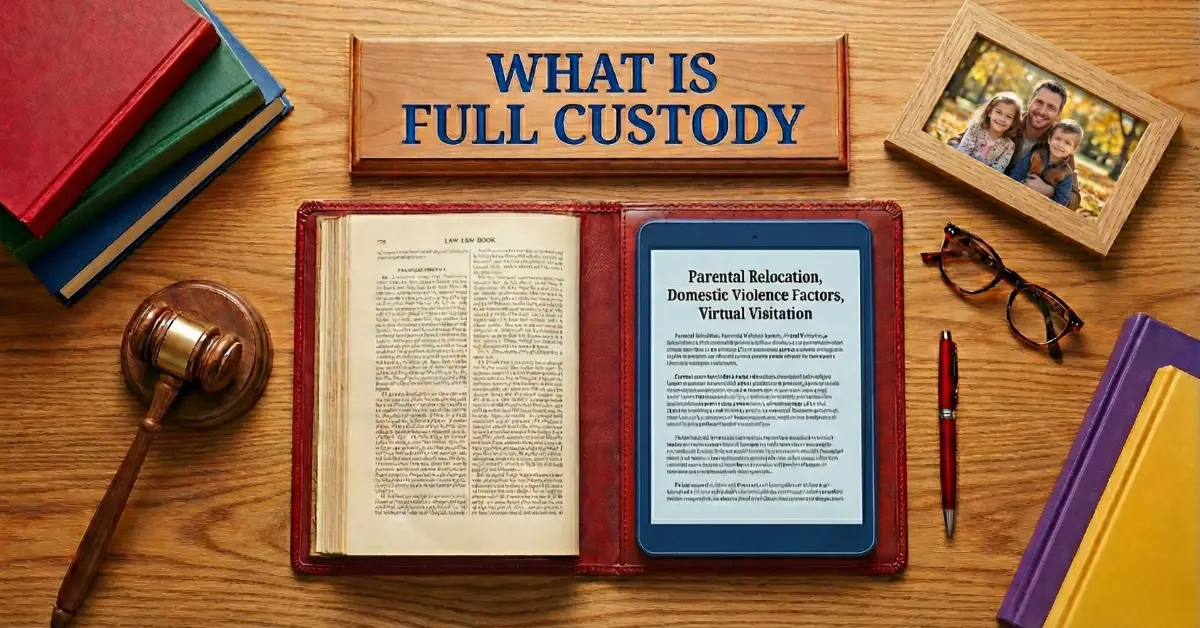In family law, full custody is one of the most important and emotionally charged concepts. It refers to a legal arrangement where one parent is granted both sole legal custody and sole physical custody of the child after a divorce or separation.
This means that the custodial parent has the exclusive right to make all significant decisions regarding the child’s life, such as their education, healthcare, and religious upbringing. Additionally, full custody means the child primarily resides with the custodial parent, and the non-custodial parent may have limited or supervised visitation rights, depending on the case.
As a senior family law attorney with years of experience, I’ve helped many clients understand the complexities of full custody, from the legal process to the emotional challenges it can bring.
In this article, I’ll explain what full custody is, the legal steps involved in obtaining it, and common challenges parents face, all while emphasizing the best interests of the child, the core principle guiding custody decisions.
Understanding Full Custody
To fully understand full custody, it’s important to grasp the differences between legal custody and physical custody:
- Sole Legal Custody
This grants one parent the exclusive right to make major decisions about the child’s life. This includes decisions related to education, medical care, and religious upbringing.
- Sole Physical Custody
This means that the child’s primary residence is with one parent, who is responsible for the child’s day-to-day care.
Full custody combines both of these types of custody, meaning the custodial parent has the authority to make decisions about the child’s life while also providing their primary care. This differs from joint custody, where both parents share responsibility for decision-making and care.
However, full custody does not necessarily mean that the non-custodial parent is entirely excluded from the child’s life. Visitation rights may still be granted, although they could be limited or supervised, particularly in cases involving safety concerns.
Real-World Example
Let’s say a mother has sole legal custody of her child and decides on the child’s education and medical care, while the father, who has limited visitation rights, only sees the child under supervised conditions due to a history of abuse.
How Courts Decide Full Custody
Courts base their decision on the best interests of the child, a guiding principle in family law. When determining whether full custody is appropriate, courts will evaluate several key factors, including:
- Parental Fitness
Courts assess whether each parent can provide a safe, stable, and supportive environment. This involves evaluating both physical and emotional readiness, as well as any history of domestic violence, substance abuse, or neglect.
- Child-Parent Relationship
The relationship between the child and each parent is critically important. If one parent has been the primary caregiver and has a strong bond with the child, this may influence the court’s decision.
- Stability
The custodial parent’s ability to offer a stable living environment is key. This includes the parent’s financial stability, employment status, and overall home situation.
- Safety and Well-being
If there is evidence of abuse or neglect, or if one parent poses a threat to the child’s well-being, full custody is more likely to be awarded to the other parent.
Best Practice Tip
If you are a parent seeking full custody, it’s essential to document everything that demonstrates your ability to provide a stable, supportive environment for the child. School records, medical records, and testimonies from professionals like counselors or teachers can significantly strengthen your case.
State Variations in Full Custody and Legal Updates
Custody laws can vary significantly across states, so it’s essential to understand the specifics of the jurisdiction in which the case is being heard. For instance:
- California generally favors joint custody arrangements, unless there is a clear safety concern or evidence of one parent being unfit for custody.
- Oregon explicitly refers to full custody as sole legal custody according to its judicial guidelines.
Changes to custody laws are also on the horizon. For example, in 2025, Massachusetts will update its family law policies to address issues related to multi-state custody cases and remote hearings. Additionally, new child support guidelines are being introduced that allow for adjustments based on a parent’s income and the child’s needs.
Key Legal Advice
Stay informed about changes in your state’s custody laws. If you’re working on a custody case, understanding local regulations and any upcoming legal changes is essential for building a strong case.

The Process to Obtain Full Custody
Obtaining full custody is not a simple or automatic process. Parents seeking full custody must navigate a series of steps in family court, including:
- Filing a Petition
The first step is to file a formal petition requesting full custody. This petition must outline the reasons why the requesting parent is best suited for full custody, backed by supporting evidence.
- Court Hearings and Evaluations
A judge will schedule hearings and may appoint a child custody evaluator or guardian ad litem to assess the child’s needs and the parents’ suitability. This evaluation may include interviews with the child, both parents, and other relevant parties.
- Presentation of Evidence
Both parents will have the chance to present evidence, such as witness testimonies, medical or school records, and expert reports from professionals like social workers or psychologists.
- Decision and Orders
After considering the evidence, the court will issue a decision. If full custody is granted, the custodial parent will have exclusive decision-making rights, but the non-custodial parent may still be entitled to visitation under specific conditions.
Advice for Legal Professionals
When presenting your case, always be thorough in providing evidence that supports the child’s best interests. This can include having experts involved to evaluate the child’s emotional and developmental needs.
Rights and Responsibilities of a Full Custody Holder
The custodial parent in a full custody arrangement has exclusive rights to make decisions about the child’s welfare. This includes decisions related to:
- Education (e.g., choosing the child’s school)
- Healthcare (e.g., making medical decisions)
- Extracurricular activities (e.g., sports, music, etc.)
However, these rights come with significant responsibilities. The custodial parent must always act in the child’s best interest and comply with court orders related to visitation and support.
Even with full custody, the non-custodial parent may still be required to pay child support, which is calculated based on factors such as income and the time spent with the child.

Modifying Full Custody Arrangements
Custody arrangements are not always permanent. Life circumstances may change, such as a parent’s relocation or the child’s evolving needs. In such cases, a parent can request a modification of the custody arrangement. The parent seeking the change must show that the modification is in the child’s best interest.
For instance, if a custodial parent wishes to relocate for work, they must demonstrate how the move will benefit the child’s education or living conditions.
Common Challenges and Misconceptions
Full custody can be a source of significant emotional and financial strain for both the custodial parent and the child. Children may experience feelings of confusion or loss, particularly if the non-custodial parent has limited involvement.
A common misconception is that full custody eliminates the role of the non-custodial parent entirely. In reality, most courts strive to maintain the parent-child relationship and may grant visitation or supervised contact when appropriate.
Frequently Asked Questions
1. What is the difference between full custody and sole custody?
Full custody and sole custody are terms often used interchangeably. Both mean that one parent has both sole legal custody and sole physical custody, granting them exclusive control over decisions and the child’s primary residence.
2. How do courts decide between full custody and joint custody?
Courts favor joint custody when both parents are capable of sharing decision-making responsibilities. Full custody is typically awarded when one parent is deemed unfit or when joint custody would endanger the child’s well-being.
3. What is the evidence needed to secure sole legal custody?
To secure sole legal custody, parents need to provide evidence that demonstrates the other parent’s inability to make sound decisions for the child’s well-being. This could include a history of abuse, neglect, or instability.
4. How does full custody affect child support?
Child support is typically based on the custodial arrangement and the parents’ incomes. The custodial parent will receive support, which helps cover the child’s needs.
5. What is the difference between joint custody and full custody?
Joint custody involves both parents sharing responsibilities for decision-making and physical care, while full custody grants one parent exclusive rights and responsibilities over both legal and physical custody.
Final Thoughts
In conclusion, full custody is a complex and significant legal decision that requires careful consideration of the child’s best interests. While it can provide stability for the child, it also comes with considerable responsibilities for the custodial parent.
Understanding the legal process, the rights and obligations involved, and staying informed about state-specific laws is crucial for parents and legal professionals alike. Always keep the child’s well-being at the center of any custody dispute, and seek guidance from a qualified family law attorney to navigate this challenging area of the law.




